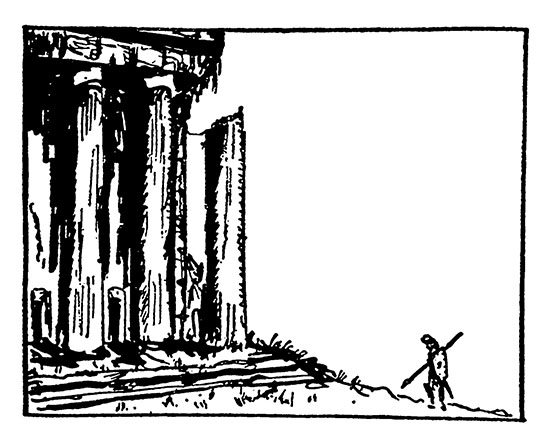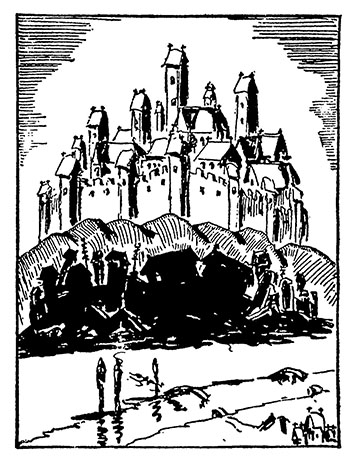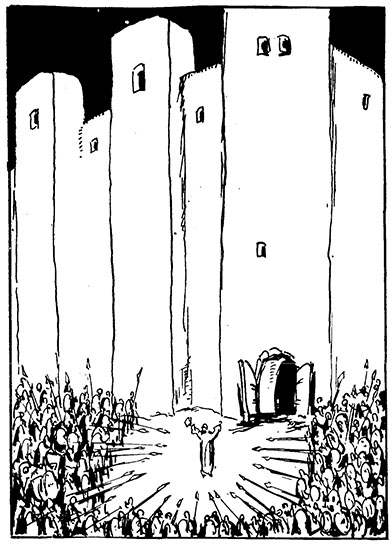Chapter 6 5. Imprisonment
When the curtain was about to fall for the last time on the ancient world, a figure appeared on the stage of history. His untimely death was a pity, but he deserved the title of "saint".
I am speaking of the Emperor Julian, nephew of Constantine the Great, who was born in the new capital of the Empire in 331.In 337, his famous uncle died, and the three sons immediately rushed to the common property and fought like hungry wolves.
In order not to let others share the inheritance, they ordered the killing of all the royal family living in and around the city.Julian's father was brutally murdered.His mother died a few years after giving birth to him, leaving the six-year-old orphaned.A frail cousin shared his loneliness with him, and the two of them studied together. Most of the content they learned was to promote the benefits of the Christian faith. .

deserted temple
When the children grew up, it was thought that it would be better to send them far away, lest the young princes of Byzantium should be exposed to the same fate as the little Byzantine princes.The two children were sent to a small village in the middle of Asia Minor. Although the life was uninteresting, Julian had the opportunity to learn a lot of useful things, because his neighbors were all mountain people from Cappadocia, very simple, They still believe in the gods handed down from their ancestors.
There is no possibility for the child to hold any important position there.He asked to concentrate on doing some research and was approved.
He first came to Nicomdi, and only there and a handful of other places continue to teach ancient Greek philosophy.His mind was so full of literature and science that he had squeezed out everything he had learned from Eusbius.
He was then granted permission to go to Athens, where he studied at the Holy Land where Socrates, Plato, and Aristotle had stayed.
At the same time, his cousin was also assassinated.His cousin, Constantius, the only remaining son of Constantine, remembering that he and his cousin, the little philosopher, were the only two living males in the royal family, kindly Take him back, let him marry his sister Helena, and order him to go to Gaul to defend against the barbarians.
It seemed that Julian had learned something more useful from his Greek teacher than gossip.In 357 the Alamanni threatened France, and Julian crushed their army near Strasbourg, and by cunning, made Mercy and the Rhine into his province.He moved to Paris, filled his library with books by his favorite authors, and despite his usual sternness, this time he could not help beaming with joy.
News of the victory reached the emperor, but the flames of celebration were not lit.Instead, they have elaborate plans to get rid of this opponent, whose success has been overdone.
But Julian enjoyed great prestige among the soldiers.As soon as they heard that the Commander-in-Chief was to be recalled (a polite invitation to return with beheading), they broke into his palace, proclaimed him Emperor, and went around saying that if Julian refused, they would kill him. he.
Julian's mind was not slow, and he accepted the promise generously.
At that time, the road to Rome was still invincible.Julian moved his troops from central France to the Bosporus coast with lightning speed.But before he could reach the capital, word came that his cousin Constantius was dead.
In this way, the pagans became the rulers of the Western world again.
What Julian was about to do was of course impossible.It is strange to say that such a wise man can think that the dead of the past can be resurrected by some force, and the age of Pericles can be revived, as long as the ruins of the Acropolis are rebuilt, in the deserted academy woods Re-inhabiting the Master, professors wearing outdated togas, speaking to each other in a language that disappeared five centuries ago, can recreate the past.
Yet this is exactly what Julian was trying to do.
During his brief two years in power, he devoted himself to reviving an ancient science that most people at the time dismissed with disdain, and to rediscovering a world ruled by monks, illiterate monks who thought everything worth knowing was contained in a single book, Independent research and investigation can only lead to the loss of faith and the burning of hell; Julian also wants to restore the joyful life of a man of high vitality and enthusiasm.
He was besieged on all sides, and even more resilient people would be disturbed and pessimistic by the opposition.As for Julian, he was completely dazed, and for a while had to rely on the real experience of his ancestors.The Christian people of Antioch threw stones and earth at him, but he would not punish the city.The dull-witted monks tried to provoke him into repeating the tragedy of the persecution, while the emperor repeatedly warned his officials: "Let no victims be made."
In 363, a benevolent Persian arrow ended this strange career.
This ending could not have been better for the last and greatest pagan ruler.
Had he lived longer, tolerance and abhorrence of folly would have made him the most imperious man of his time.From his hospital bed he could recall with ease that no one under his rule was put to death for disagreeing with him.But his Christian subjects repaid his kindness with eternal hatred.They boasted that the emperor's own soldiers (members of a Christian regiment) had shot him, and elaborately concocted eulogies in praise of the murderer.They talked a great deal about how Julian had confessed the error of his own course and the power of Christ before his death.In order to slander the name of this gentleman who lived a life of frugality and asceticism, and devoted himself to the happiness of his subjects, they searched their brains and used all the pejorative adjectives that were in vogue in the fourth century.
Julian was carried to the grave, and the Christian bishops could at last claim to be the true rulers of the empire.They immediately began sweeping through every corner of Europe, Asia and Africa, destroying all opposition.
Between 364 and 378, the brothers Valentinian and Valins passed an edict prohibiting any Roman from sacrificing animals to the old gods.This is tantamount to depriving the pagan priests of their income, and they must find another way out.
However, these regulations are still relatively light.The laws promulgated by Emperor Theodos not only allowed all subjects to accept Christianity, but also had to accept the form of "Catholicism"; he himself seemed to be the patron of Catholicism, making Catholicism monopolize people's spiritual world.
After the law is promulgated, all those who insist on "wrong views", all those who cling to "stupid heresies", and all those who continue to be faithful to "shameful teachings" will all suffer the consequences of refusing to implement the law and be punished. exile or death penalty.
Since then, the pace of the old world's final extinction has been accelerated.In Italy, Gaul, Spain, and England pagan temples were torn down to make way for bridges, streets, walls, and watchtowers, or rebuilt as Christian meeting places.Thousands of idols of gold and silver that had accumulated since the founding of the Republic were confiscated or stolen, until few remained and what remained were smashed to pieces.
Alexandria's Serapeyum temple, revered by Greeks, Romans and Egyptians for more than six centuries, was razed to the ground.The university, famous from the time of Alexander the Great, remains in its place, continuing to teach and explain ancient philosophy.Students from all corners of the Mediterranean came to hear the news.The bishop of Alexandria ordered that the university not be closed, but the monks of the diocese went their own way.They broke into the church, tortured Hypatia, the last Platonic teacher, tore her into pieces, and threw her into the street to be fed to the dogs.
Things were even worse in Rome.
The temple of Cupid was closed, and the ancient Roman oracle, the classic of ancient Roman beliefs, was burned.The capital was in ruins.
In Gaul, where the famous Bishop of Tours was in power, the old god was declared to be the predecessor of the devil in Christianity, and all temples disappeared from the earth.
In the remote countryside, sometimes when peasants would rise up to defend their beloved gods, armies would come and quell "Satan's rebellion" with axes and gallows.

new world empire
The destruction of Greece proceeded more slowly, but in 394 the Olympic Games were finally banned.As soon as the center of Greek state life (which had been going on without interruption for one thousand one hundred and seventy years) ceased, other activities fell into disintegration.Philosophers were expelled from the country, and finally, by order of the Emperor Justinian, the University of Athens was closed and its funds confiscated.The last six professors lost their livelihood and fled to Persia.King Jothroth received them kindly, and arranged for them to spend their idyllic old age and play a magical and novel Indian game-chess.
By the first half of the fifth century, Archbishop Chrysostaus declared quite literally that the books of ancient authors and philosophers had disappeared from the face of the earth.Cicero, Socrates, and Homer (not to mention the mathematicians and astronomers hated by all good Christians) were thrown into oblivion in attics and cellars.It will take another six hundred years for them to see the light again, and until then people can only treat literature and art with trepidation, at the mercy of theologians.
It's a wacky diet (in medical jargon), but it's not balanced.
Although the Christian Church defeated the pagans, it could not get rid of the difficulties.The poor peasants of Gaul and Lusitania, clamoring for pilgrimage to their ancient gods, were easy to subdue.But what matters is whether the true face of Christ as portrayed by the people of Ostrogos, Alamein, and Longobard for Elius, the priest of Alexandria, is correct, and whether Athanasius, the nemesis of Elius in the same city False and red-faced, the Longobards and the Franks quarreled over whether to insist that Christ and God were "not of the same kind, but likeness," and the Vandals and Saxons tried to prove what Nestor said. The correctness of saying that the Virgin Mary was only "Mother of Christ" and not "Mother of God" was torn apart, and the Burgonis and Frisians were at loggerheads for acknowledging or denying the dual nature of Jesus as half-man, half-god.These savages with strong limbs and simple minds, although they accepted the teachings of Christianity, unfortunately went astray.But they were staunch friends and supporters of the Church, and could not be excommunicated by the general precepts, nor threatened with hellfire.They must persuade with euphemisms, point out mistakes, and bring back corps of believers with love and devotion.They must first have a clear doctrine and know what is right and what is wrong, so that they can solve the problem.
The demand to bring together the various statements of faith led to the famous assembly, the "Christian Worldwide Confederation."Since the middle of the fourth century, such councils have been held at irregular intervals to decide which teachings are true and which bear the traces of heresy and should be accused of errors, fallacies and heresies.
The first meeting of the Federation was held in Nicaea, not far from Troy, in 325, the second meeting was held in Constantinople fifty-six years later, and the third meeting was held in Ephesus in 431. held.Later, the conference was held several times in Charleston, twice in Constantinople, once in Nicaea, and finally in Constantinople again in 869.
Since then, councils have been convened in Rome or in any city in Europe that the pope may designate, for in the fourth century it was tacitly agreed that although the emperor had the right to arrange the meeting place (a privilege that also obliged him to pay for the travel of his loyal bishop), But the advice of the powerful bishop of Rome must be taken seriously.We have no way of knowing who presided over the first Council of Nicaea, but subsequent councils were presided over by the pope, and decisions of the congregation had no effect without the approval of the pope or his representatives.
Now we bid farewell to Constantinople, and take a walk in the mellow regions of the West.
The controversy between tolerance and arbitrariness has been going on and on. One side promotes tolerance as the highest virtue of human beings, while the other denigrates it as a product of moral weakness.I don't want to talk about this from a theoretical point of view.It must be admitted, however, that the supporters of the Church have always been right when they justify the brutal suppression of heretics.
They said: "The church, like other organizations, is like a village, a tribe, and a forest. There must be a commander-in-chief, a set of clear rules and regulations, and all members must abide by it. Anyone who swears allegiance to the church is tantamount to taking an oath of respect." Commander in chief, obey the rules. If they can't do it, they have to try their own way and get out of the church according to their own decisions."
So far, these are correct and reasonable.
Nowadays, if a minister no longer believes in the classics of the Baptist sect, he can convert to the Methodist sect, and if for some reason he also loses his belief in the doctrine of the Methodist sect, he can also switch to the Unitarian or Catholic sects. Or Judaism, you can also believe in Hinduism and Turkish Muslims.The vast world is full of roads and roads, and everyone is free to ride. Except for the hungry family members, no one is against him.
But this was the age of ships, trains, and economic opportunity.

dissident
The world in the fifth century was not so simple.The influence of the Bishop of Rome is everywhere and everywhere.Of course, one can go to Persia or India, but the journey is far away, nine times out of ten will not return, and it means eternal separation of wives and children.
Since people feel that their understanding of Christ is correct, and it is only a matter of time before the church is persuaded to revise its doctrine, why should they give up their right to free belief?
That's the point.
Early Christians, both devout and heretical, believed that the value of ideas was relative, not absolute.
The learned theologians try their best to explain the unexplainable things and summarize the essence of God into a formula, which is as absurd as mathematicians hang each other for the dispute over the absolute value of X.
But self-righteousness and tyranny have pervaded the world, and until recently advocates of tolerance on the basis that "one could never tell right from wrong" risked their own lives by exercising their claims, and they had to Advice are carefully hidden in Latin, and few intelligent readers understand them.

deserted temple

new world empire

dissident
